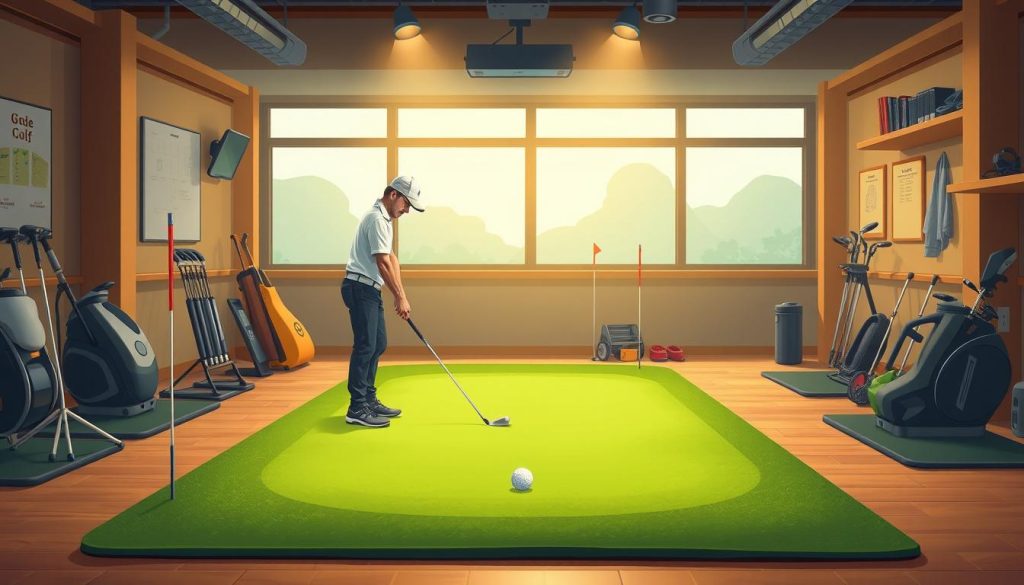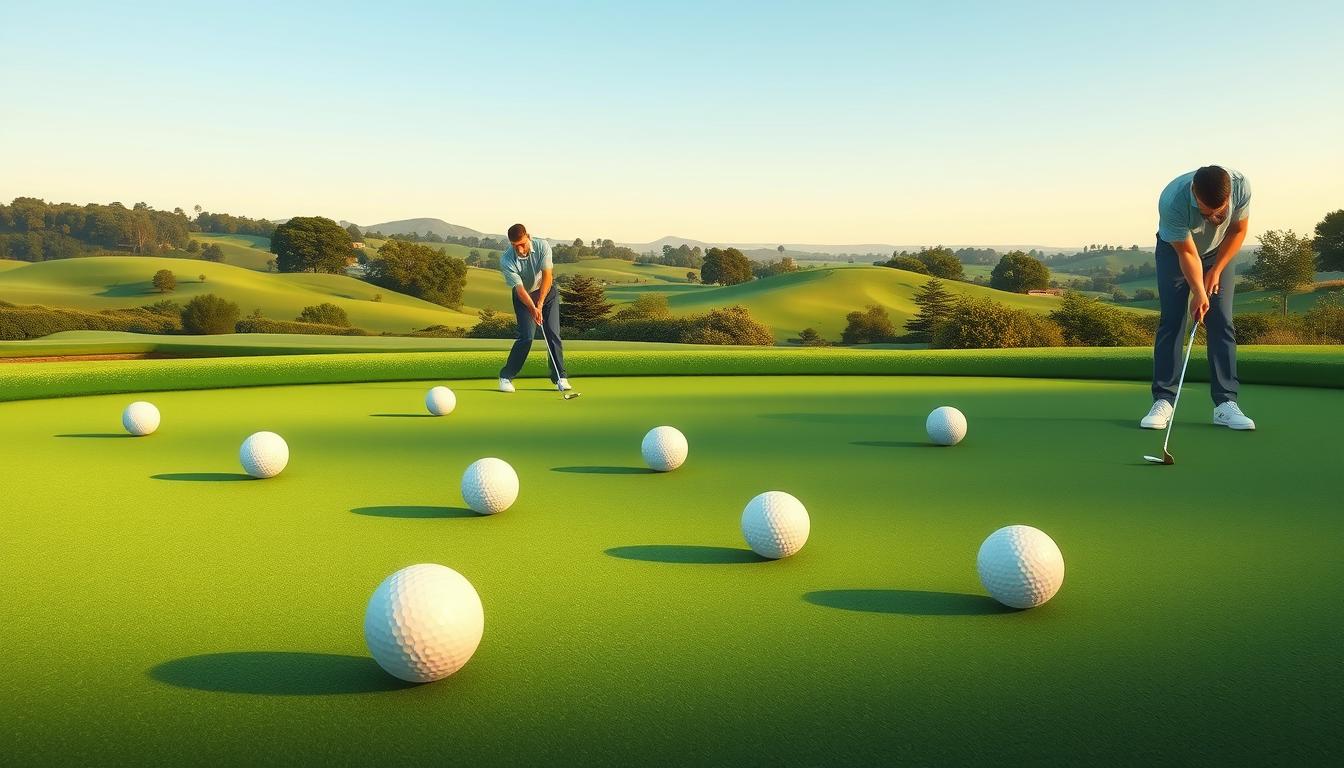Mastering your putting stroke is key to lowering your golf scores. This guide shares essential golf putting techniques. It helps you improve your stroke and become more consistent. Since about 40% of the game is played on the green, improving your short game can greatly boost your performance.
These drills are great for both beginners and experienced golfers. They cover everything from proper setup to advanced distance control exercises. By practicing these techniques often, you’ll see your putting skills improve, helping you sink more putts and lower your scores.
To make the most of your practice, focus on stroke mechanics, speed control, and alignment. Adding these drills to your routine will help you develop muscle memory and improve consistency. Remember, even pros spend a lot of time perfecting their putting. So, commit to regular practice for the best results.
Key Takeaways
- Consistent practice is essential for improving your putting stroke
- Focus on proper setup, alignment, and stroke mechanics
- Incorporate speed control and distance drills into your routine
- Use indoor putting mats for convenient practice at home
- Track your progress and celebrate incremental improvements
- Develop mental toughness through pressure simulation drills
- Analyze and correct common putting mistakes to enhance performance
Understanding the Fundamentals of Putting Stroke
Improving your golf game starts with mastering putting stroke basics. A good foundation is built on proper putting setup. This setup is key for a consistent and accurate stroke.
The Importance of Proper Setup
A neutral setup with a square putter face is crucial. It allows for a smooth, pendulum-like swing. This is important for aiming correctly.
Make sure your body lines – feet, hips, shoulders, lower arms, and eyes – are aligned. This helps avoid common mistakes that lead to missed putts.
Eye Alignment and Ball Position
For the best putting, place the ball slightly left in your stance. Your eyes should be right over the ball, especially for short putts. This helps you aim and read the green well.
Grip Pressure and Stance Width
Keep your grip light to improve feel and control. Your stance should be wide enough for balance and consistency. Stand with about 75% of your weight on your left heel, with the ball 2 inches inside it.
| Setup Element | Recommendation |
|---|---|
| Weight Distribution | 75% on left heel |
| Ball Position | 2 inches inside left heel |
| Body Alignment | Parallel to target line |
| Forearm Position | Parallel throughout stroke |
Practice these putting stroke basics often. Use mirrors to check your setup and alignment. Success in putting comes from reading the green and sticking to your plan.
Essential Equipment for Putting Practice
To get better at putting, you need the right tools. Golf putting aids help with different parts of your stroke. Let’s look at some key tools to boost your putting skills.
Indoor putting mats are great for regular practice. They mimic the feel of a real green, so you can practice all year. Alignment sticks help you line up your shot right.
Putting mirrors are essential for checking your stance and eye position. The PuttOut Mirror, for example, shows you exactly where your stroke is right. This helps you improve your putting technique.
| Golf Putting Aid | Price | Key Feature |
|---|---|---|
| GoSports Pure Putt 9′ Putting Ramp | $99.99 | Improves stroke accuracy |
| Eyeline Golf Putting Alignment Mirror | $39.99 | Enhances eye positioning |
| Perfect Practice Laser Putting Glasses | $69.99 | Visual feedback for alignment |
| Pure2Improve Practice Putting Balls | $14.99 | Varied weight for feel training |
If you’re watching your budget, you can use everyday items for practice. Rulers or yardsticks work as alignment tools. Manila folders can even make putting gates. These simple tools let you practice without spending a lot.
Basic Putting Stroke Mechanics
Improving your golf game starts with mastering putting stroke mechanics. Let’s look at the key elements of an effective putting stroke.
Straight-Back-Straight-Through vs Arc Stroke
There are two main putting strokes: straight-back-straight-through and arc stroke. The straight-back-straight-through method moves the putter directly back and forth. On the other hand, the arc stroke follows a path that goes inside-to-square-to-inside.
Your natural tendencies and comfort level will help you choose the right style.
Pendulum Motion Basics
The pendulum motion is the base of both strokes. Brad Faxon, a putting expert, suggests keeping a steady tempo. He recommends a 2:1 ratio of backswing to downswing for stability and consistency.
Practice exaggerating your swings to build confidence and reduce hesitation on the green.
Face Control During Stroke
Controlling the putter face is key for accuracy. Faxon says impact alignment is more important than club face alignment at address. The putter face at impact affects ball direction more than swing path.
Aim for a +2 degree launch angle for the best results on most surfaces.
Remember, your putting grip and set-up are crucial. They account for 80-90% of technique changes. Focus on a comfortable stance and grip for natural movement and feel. Mastering these mechanics will help you sink more putts and lower your scores.
Putting Stroke Drills Guide
Mastering your putting stroke is key to lowering your golf scores. This guide covers effective drills to boost your skills on the green. By practicing these, you’ll get better at alignment, distance control, and accuracy. Mastering these techniques not only sharpens your overall consistency but also builds confidence in high-pressure situations. For those just starting, incorporating golf swing drills for beginners alongside focused putting practice can create a strong foundation for overall game improvement. With dedication and the right approach, you’ll see noticeable progress in your putting and your ability to read the green effectively.
Mirror Practice Techniques
Using a mirror for putting practice is a great way to improve alignment and setup. Place a small mirror on the ground and stand over it. Check your eye position, shoulder alignment, and putter face angle. This visual feedback helps you make adjustments and build muscle memory for the right setup.
Gate Drill Variations
The gate drill is a popular exercise for better alignment and contact quality. Set up two tees or alignment sticks wider than your putter head. Practice putting through this “gate” without touching the tees. This drill helps you start the ball on the right line and keeps your stroke consistent.
Alignment Rod Exercises
Alignment rods are great for putting stroke drills. Place a rod on the ground parallel to your target line. Practice putting along this line to improve your stroke path consistency. You can also set up two parallel rods to help you see the correct path and keep your putter face square.
| Drill | Benefit | Equipment Needed |
|---|---|---|
| Mirror Practice | Improves setup and alignment | Small mirror |
| Gate Drill | Enhances stroke path and contact | Two tees or alignment sticks |
| Alignment Rod Exercise | Promotes consistent stroke path | One or two alignment rods |
Adding these putting stroke drills to your practice routine will improve your putting. Remember, mastering putting is crucial in golf. Spend time on these exercises to see big improvements in your game.
Speed Control Training Methods
Mastering putting speed control is key to lowering your golf scores. Being able to control the distance of your putts can greatly impact your game. Let’s look at some effective ways to improve your putting speed control.
The tee ladder drill is a great way to boost your putting consistency. Set up tees at 5, 10, and 15 feet from the hole. Practice putting to each distance, focusing on the right speed for each putt. This drill helps you develop a feel for different distances.
The leap frog drill is another effective method. Create a 15-foot gap and putt multiple balls, increasing the distance each time. This exercise sharpens your ability to judge distance and adjust your stroke accordingly.
Visualization is crucial in putting speed control. Try the circles drill: imagine a target area behind the hole for short putts and a three-foot circle for longer ones. This mental exercise improves your speed judgment and boosts confidence.
| Drill | Purpose | Technique |
|---|---|---|
| Tee Ladder | Consistency at varied distances | Putt to tees at 5, 10, 15 feet |
| Leap Frog | Distance control | Putt multiple balls with increasing distances |
| Visualization Circles | Speed judgment | Imagine target areas behind hole |
| 5 Golf Ball | Stroke consistency | Replicate strokes without result feedback |
About 40% of your golf game is spent putting. Spending time on these speed control training methods will greatly improve your performance on the green.
Advanced Distance Control Drills
Mastering distance control is key to lowering your golf scores. Let’s look at some effective drills to improve your game.
Clock Drill Method
The clock drill is loved by pros. Place 12 balls around the hole like a clock. Start at 3 feet and move out to 12 feet.
This drill sharpens your distance judgment from different angles.
Ladder Drill Technique
The ladder drill is great for distance control. Start with balls at 3 feet from the hole and go up to 30 feet.
Try to make a “ladder” of balls, each one a bit further than the last.

Three-Ball Speed Control Exercise
This drill is all about consistent speed. Place three balls 20 feet from the hole.
Putt them one after another, aiming to get each ball closer to the hole. It helps you feel different distances.
Remember, keeping a steady tempo is crucial in these drills. Practice often, and you’ll see fewer three-putts.
One-Handed Putting Drills
One-handed putting drills are a game-changer for golfers. The Tiger Woods putting drill is a well-known technique. It uses just your dominant hand to improve your stroke’s consistency.
To do this drill, hold the putter with your dominant hand. Keep your motion smooth and pendulum-like. This drill helps you feel the club better and control the face at impact.
Adding this drill to your routine can greatly improve your putting. Try it with the gate drill. Set up two tees or sticks to create a “gate” for your putter. This setup gives you instant feedback on your stroke’s path and face angle.
| Drill | Benefits | Key Focus |
|---|---|---|
| One-Handed Putting | Improved feel and release | Smooth, pendulum motion |
| Tiger Woods Putting Drill | Enhanced stroke consistency | Face control at impact |
| Combined Gate Drill | Stroke path feedback | Putter face alignment |
Practice these drills often to see big improvements in your putting. Remember, being consistent is crucial. Spend time on these exercises, and you’ll get a more reliable and accurate putting game.
Indoor Practice Techniques
Mastering your putting stroke doesn’t need a big golf course. You can improve your skills with indoor putting practice and home drills. These methods let you work on your game all year, no matter the weather or access to a green.
Using Putting Mats
Putting mats are great for indoor practice. They mimic green conditions and have markings for alignment and distance. Place a mat in your living room or office to practice whenever you can.

Household Items for Practice
Don’t have a putting mat? No worries! You can make effective drills with everyday items:
- Use cups as targets
- Create alignment lines with string or masking tape
- Set up tees or coins as obstacles for precision drills
Space-Saving Drills
You can still improve your putting even with little space. Try these small drills:
- Putting gate drill: Set up two tees with a half-inch gap on each side of your putter. Practice making smooth strokes without hitting the tees.
- Four corners drill: Place four balls around an imaginary hole, each four feet away. This helps you practice breaking putts in a small area.
- Ladder drill: Place markers at three, six, and nine feet. Sink three putts in a row from each distance before moving back.
Remember, consistency is key. Regular practice with these indoor techniques can greatly improve your putting on the course.
Common Putting Stroke Mistakes and Corrections
Putting stroke errors can mess up your game, but you can fix them. Studies show top golfers keep their wrists steady, leading to better results. You can learn from them to improve your putting.
One common mistake is poor alignment. To fix this, use alignment sticks for $20-25. These tools are found on driving ranges and help you line up right. Practice with them to get better at aiming and staying consistent.
Another problem is not controlling stroke length well. Try the clock drill or ladder drill to improve. These methods help you control distance better. Also, aim for uphill putts to make your game easier and break 80 often.
Not having a steady tempo is another error. Use a metronome to keep a steady beat. Focus on these areas and practice about 40% of your time on your weaknesses. This will help you fix putting mistakes and lower your scores.
FAQ
How important is putting in golf?
What are the key elements of a proper putting setup?
What equipment do I need for effective putting practice?
What are the main types of putting strokes?
What are some effective putting drills for beginners?
How can I improve my putting speed control?
What are some advanced putting drills?
How can I practice putting indoors?
What are common putting stroke mistakes and how can I correct them?
How can one-handed putting drills improve my stroke?
Source Links
- https://www.performforgolf.com/blog/how-to-put-better-the-best-putting-drills
- https://hackmotion.com/putting-stroke-tips/
- https://www.scienceandmotion.com/download/docs/fundamentals/The Fundamentals of Putting1.pdf
- https://www.pga.com/archive/basics-putting?srsltid=AfmBOop-VIqETbujg12CSPq9VjbB55IRw0aGFBXKyX0rP8Sazceu22h7
- https://visioputting.com/
- https://golfweek.usatoday.com/2024/10/26/best-golf-training-aids-to-improve-your-putting/
- https://skillest.com/blog/putting-like-brad-faxon-tips-to-improve-your-putting-stroke/
- https://golfinsideruk.com/putting-technique-the-putting-stroke-explained/
- https://www.golfmonthly.com/tips/putting-drills-166691
- https://practical-golf.com/putting-tips
- https://www.golfzonleadbetter.com/blogs/master-your-putting-game-6-effective-putting-drills-for-precision-speed-alignment/
- https://hackmotion.com/putting-drills-for-speed/
- https://primeputt.com/blogs/golf/best-indoor-putting-drills?srsltid=AfmBOore4Hm4Xn0PxOQd8KCvEBqB7AiVr7DSbbtUgGih166z5f3pZ5Jw
- https://golf.com/instruction/putting/10-pga-tour-player-approved-putting-drills-you-can-try/
- https://www.golfmonthly.com/videos/putting-tips/putting-drills-for-distance-control
- https://proputtsystems.com/putting-drills-speed-short-putts/?srsltid=AfmBOoq7JUXmPjf9U_3zlCgj5wmbQa_uIH78Fp2cmeZsEIx91x33G982
- https://primeputt.com/blogs/golf/best-indoor-putting-drills?srsltid=AfmBOooVYCJ3jKMMjT73tMNrIdPz3tyD7kyrTxcQDoL8Z4Epzykfok78
- https://www.evnroll.com/blogs/straight-talk/top-10-putting-drills-for-golfers?srsltid=AfmBOorwWXnwvvfXCDMSlYd0B9yeoFCHKPQTUMsi0KUZQQOONhobvY17
- https://golf.com/instruction/putting/putting-exercises-at-home-adam-smith/
- https://www.pga.com/story/get-better-at-putting-try-these-six-tips-to-improve-your-stroke?srsltid=AfmBOorwUGCSmYu7SADsyYzfY-bduxAwEkiGpx404Ogg4Kag34dI-GVp
- https://hackmotion.com/how-to-break-80-in-golf/
- https://golf.com/instruction/how-to-hold-a-golf-club-the-proper-golf-grip/
- https://www.golfmonthly.com/tips/how-to-use-golf-alignment-sticks


